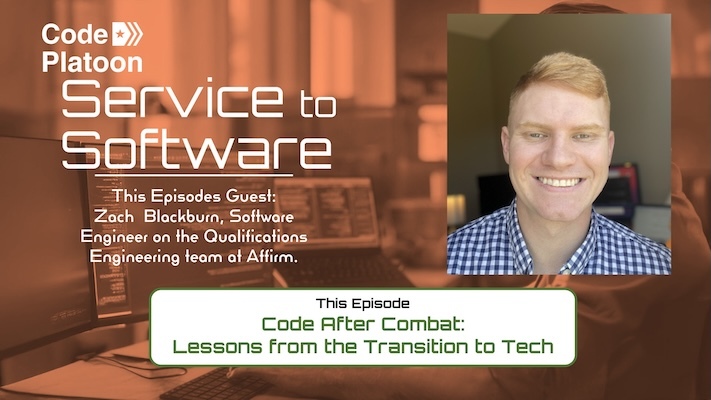Code after Combat: How an Apprenticeship Launch a Veteran Tech Career

TLDR: Marine Corps Veteran Zach Blackburn went from no coding experience to Software Engineer at Affirm in less than a year through a coding bootcamp and an apprenticeship. His journey shows how tech apprenticeships can give Veterans the structure, mentorship, and real-world experience needed to make a successful military-to-tech transition. Today, Zach is thriving in his role, proving that with the right training, Veterans can land and succeed in software engineering careers.
“You don’t belong here, and someone’s going to find out.” Imposter Syndrome echoed in Zach Blackburn’s head during his first few months as a professional software engineer at Affirm.
Before coding bootcamp, Zach—a Marine Corps Veteran from rural Kentucky—had absolutely no coding experience. Now, he was surrounded by elite university grads, shipping code in a high-speed tech environment, and he felt like a fraud.
How had he gone from never writing a line of code to becoming a software engineer in less than a year?
The short answer: hard work and an apprenticeship program.
Why Veterans Should Consider Tech Apprenticeships
Before Code Platoon, Zach didn’t even know tech apprenticeships existed. He thought he’d end up in a government contracting job after bootcamp. But when he landed an apprenticeship with Affirm’s Qualifications Engineering team, everything changed.
“The biggest benefit was that my apprenticeship was built for candidates with non-traditional backgrounds, including Veterans like me. We bring skills traditional university graduates don’t have,” Zach says.
Building Confidence in a Tech Apprenticeship
Once he started at Affirm, Zach hit the ground running. His team knew what to expect from an apprentice. They supported him through the transition and helped him build both his technical skills and his confidence.
But transitioning to tech still wasn’t easy. Imposter syndrome followed him into every meeting.
“I worked with some incredibly talented people, almost too smart. I didn’t feel like I had earned my place in the room most days,” he says.
Over time, that changed. The apprenticeship gave Zach space to learn the tech stack and the culture. His team encouraged questions and even gave him a major project to own and present.
That project, and the support of his team behind him, shifted his mindset.
“I started to feel like I actually knew what I was doing,” he says.
Becoming a Full-Time Software Engineer
During the six-month apprenticeship, Zach was already working like a Software Engineer 1. He just needed time to adjust to the new role.
“I got to see how code is deployed in a production environment, how pull requests work in a high-speed company, and how tools I had never heard of in my life work. It was an invaluable learning experience,” Zach says.
By the end of six months, Zach had proved himself and earned a full-time offer, along with every other apprentice in his cohort.
Now, Zach is thriving in a career that lets him provide for his growing family while continuing to level up his skills.
“I love software engineering, and I never had benefits like this in the military,” Zach says. “Now, with a toddler at home, I can provide for my family while working remotely on a great salary.”
Using AI in Software Engineering
Zach didn’t stop learning after landing the job. One of his most valuable resources now is AI. At Affirm, Zach uses tools like Cursor and Gemini every day.
“Cursor helps me clean my code, write functions, and understand what’s going on under the hood. Gemini is great for reading documentation and rewriting it for review by senior engineers.”
But Zach is quick to point out: AI isn’t magic, and it won’t replace foundational coding skills.
“If you’re starting in tech, just plugging a question into AI and copying the answer is a terrible strategy. AI tools will only confuse you more if you don’t understand what you’re building,” he says. “Focus on learning the basics first, then use AI to break down problems, spot patterns, and explore better solutions.”
“I think interviewers will start asking, ‘How do you use AI to be more productive?’ It’s not about avoiding AI or relying on it; AI shouldn’t do your thinking, but it can help you think faster once you know the basics.”
Ready to Make the Leap?
If you’re wondering whether you belong in tech, take it from Zach: you don’t need a computer science degree. You need structure, support, and a path forward. Code Platoon offers all three.
Join a community of Veterans and military spouses who are building new futures one line of code at a time.
Explore Code Platoon’s AI-powered technical training programs. »
Zach’s journey is just one of many inspiring military-to-tech stories we feature on the Service to Software podcast. Want to hear the full conversation? Check out Zach's episode below to learn how he built confidence, leveraged apprenticeships, and found his place in tech.






